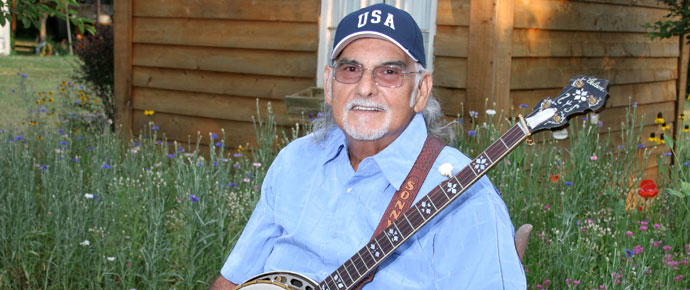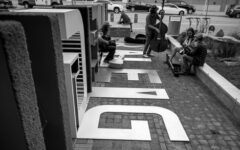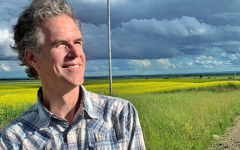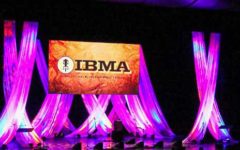
Ask Sonny Anything is a recurring feature where our readers pose questions to the great Sonny Osborne, one half of the iconic Osborne Brothers who redefined bluegrass music in the 1960s, and noted banjo maven and collector of fine prewar instruments. Everyone is encouraged to pose queries of your own each week in the comments, about his history in the music, his wealth of banjo knowledge, or regarding any life advice you might be needing.
Sonny,
First off let me say, in my rankings you are in the top 3 pickers to have ever touched the banjo. I am from Bogalusa, LA. So my question is about the song that y’all recorded titled Bogalusa. Do you know who wrote the tune? Did y’all ever do a show there? I guess anything about the song that you can tell me would be interesting to me. Was always curious as to where the song came from and if there was some kind of weird backstory to it.
Thanks, Joe B.
Hey there, Joe B. Welcome in hyer! Well, man, I appreciate your banjo comment. You don’t have any way of knowing how that makes an older man feel. (Unless you’re older than 82). That song was written by Boudleaux and Felice Bryant. No weird story connected to this song. We were in the midst of recording an album and I called Boud and asked if he had anything we could do. He replied that he had one he thought we might like. He brought it over, we learned it, and with his supervision we recorded it, and this is the finished product. I produced this and a bunch more of our recordings. On this particular album I totally ruined what could have been a pretty good album. It was much too busy… in that I had way too much going on. I need to also mention that I believe we missed out on a pretty high chart cut in I Can Hear Kentucky Calling Me by my stupidity. I just overdid everything by having too much going on.
—–
Sonny,
How did The Bluegrass Banjo Pickers project come about?
James P
James….Howdy, howdy. The Bluegrass Banjo Pickers came about because RCA wanted to do an interview with Bonnie Parker’s sister concerning the Bonnie and Clyde era of history, and their demise. They wanted someone to play a slow, soft version of Foggy Mountain Breakdown while the sister was being interviewed and they asked me to play the banjo. Also could I do a complete album of tunes pertaining to that time period. I think Bobby played the mandolin, Buddy Spicher played the fiddle, and I just can’t remember the rest of the session guys. There was no contract involved and when it was released it was titled The Bluegrass Banjo Pickers. To the best of my knowledge that is the story. The guy doing the interview was a Grand Ole Opry, WSM announcer. A permanent employee of WSM radio.
s
—–
Sonny, I really enjoy reading this article. Thank you so much. My father, rest his soul, introduced me to bluegrass. We shared many great moments at shows and festivals. He introduced me to Bean Blossom (Indiana) and Poppy Mountain (Kentucky). We also saw the Osborne Brothers (with Boxcar Willie) on campus at Ball State University’s Emens Auditorium back in the mid-1980s during my college years. Live performances are great because you never know exactly what you’re going to hear or see. Your show at Ball State was the first time that I’d heard live bluegrass played indoors. I remember how clear and polished everything sounded. There’s a beautiful gem in Cincinnati, Memorial Hall. It’s an older and smaller venue (seats around 450) with great acoustics. Most performers I’ve seen there (the Seldom Scene, Marty Stuart, Peter Rowan, Béla Fleck) comment on how much they love the place. So Sonny here’s the question: Which did you prefer more, playing outdoor festivals or indoor shows? Did you have any favorite locations and what made them special?
Larry W.
Larry. Thank you for all the interesting information. You mentioned Bean Blossom. I loved to play there because Bill was always there when we played, and I always had fun with him. And sometimes he sang with us. Always a good time. Ball State with Boxcar was good. Sound was not the best. Box had a place in Branson, Missouri which we played once. That was enough. I was never a fan of the tourist venues. Always a good crowd but most time they didn’t have a clue who they were seeing on stage. Poppy Mountain… it was so hard to get a vehicle (BUS) up that hill so by the time we got to the concert grounds we were mad, the owners were mad, and so it was not a favorite place for us. Also, and speaking only for us and in all honesty. There seemed to always be too much alcohol for it to be a really good time. A person had to be on alert most of the time and fights would break out. The brothers who ran the festival were nice to us and we always were paid, so my opinion doesn’t mean much, but it’s the truth. They had large crowds and the sound was always respectful. My favorite indoor venue other than the Ryman Auditorium, that would be Woodstock, Illinois. Probably held 600-700 and was always packed. We played there 5 or 6 times. Outdoor would have to be Don Day’s Starvy Creek Festival in Conway Missouri. Great crowd, atmosphere was tops. Don was always honest and a gentleman.
s
——
Sonny,
I have read many accounts of famous bluegrass acts and how they had to work day jobs to make ends meet, even during periods when they were quite popular. When fans view these acts from afar they are sometimes guilty of thinking it’s all fun and games. Did you and Bobby have any sleepless nights worrying about finances. At what point in your career did you finally feel like you were making it as professional musicians?
Mike E
Mike. Thank you for bringing up this. Any part of making a decent living in bluegrass music is purely luck and accidental. Being at the right place at the right time. I can only speak for the Brothers. Yes, we did have more than one discussion on whether we should go on, or just give it up. I called my Dad on more than one occasion…. and he always asked the same questions. “Where are you and how much do you need?” We did OK after we left Knoxville in June of 1953. We always had enough to survive without doing the day job routine until we went to the WWVA Jamboree in 1956. Actually, we did pretty well in Wheeling, but not well enough. This is when the “Dad calls” popped up. You know, he never once asked why, it was always the same…”where are you and how much do you need?” HE HAD MAJOR FAITH IN HIS BOYS.
We probably realized that we were on the right road in 1963. This is when The Wilburn Brothers took interest in our potential. Doyle arranged a Decca recording contract and part of the overall deal was to sign with their Sure Fire Publishing Co., where Teddy was a genius at finding good solid material for us to record, and he helped Bobby with his songwriting, and the Wilhelm booking and management agency which Smiley Wilson ran. We agreed but we also told Doyle and Teddy that to survive, we MUST have The Grand Ole Opry. In those days it was that important. Doyle told us to give him 18 months to get that done, and if he couldn’t do it in that length of time we would be free to do anything we wanted. Thirteen months later we were members of the Opry. I think that’s when we realized our dream had come true.
s
If you have something you would like to ask Sonny, be sure to post it in the comments below, or send it to us directly.







